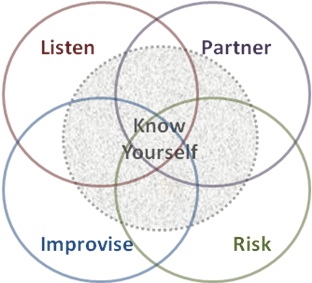The Five Essential Trust Skills: Don’t Leave Home Without Them
 A competency model won’t answer the mail when it comes to building trustworthiness—in fact, there’s risk in attempting to reduce trust to a series of behavioral definitions. At the same time, there is value in culling down the essential skills of a Trusted Advisor to a practical number.
A competency model won’t answer the mail when it comes to building trustworthiness—in fact, there’s risk in attempting to reduce trust to a series of behavioral definitions. At the same time, there is value in culling down the essential skills of a Trusted Advisor to a practical number.
I narrow it down to the following five: Listen, Improvise, Risk, Partner, and Know Yourself.
Common Denominators
The five essential skills share important characteristics:
- They appear elementary—easily dismissed as too basic to merit our attention. (“I’ve been in sales for 20 years; I know how to listen by now!”) They’re deceptive that way.
- They’re capabilities you can practice, and should practice over and over again. The five essential skills are to a Trusted Advisor what scales are to a maestro.
- They’re inextricably linked. Improvisation requires risk, partnering requires listening, and all of them require knowing yourself well to be effective.
Essential Skills, Defined
There’s a lot to be said for simplicity, hence—five and only five. (Interestingly, Steve Arneson, formerly head of leadership development at Capital One, AOL, Time Warner Cable, and a division of PepsiCo, agrees in principle; he advocates for eight—not 67—essential competencies for leadership.)
Here are the five essential skills of a Trusted Advisor:
Listen. Every day, garden-variety listening—which is what most leadership development, consulting skills, and sales training programs teach—is listening with a purpose, and usually that purpose is self-oriented: to sell, to convince, to get smarter, to buy time. By contrast, the kind of listening that engenders trust—deep trust—is not purpose-driven listening to identify needs or to mine for data you may extract to justify the pitch/sell/recommendation/opinion you have to deliver. It is, instead, empathetic listening where the focus is actually on the act of listening itself.
Improvise. The business world is rife with the unexpected including tricky client situations and other uncomfortable and awkward moments that occur at the worst possible time. Let’s call these Moments of Truth. And in these moments, the skill of improvising—inventing, composing, or performing with little or no preparation—is precisely what you need. Improvisation is relevant to any would-be Trusted Advisor because Moments of Truth are inevitable and how you handle them says a lot about who you are.
Risk. There is no trust without risk. Certainly no deep trust. Yet most of us worry about doing something that feels risky—like speaking a hard truth or sharing something personal—because we don’t think we have enough trust in the relationship for that risk to be tolerated. The irony is it’s the very act of taking those risks that creates trust.
Partner. Look up “partner” in the dictionary and you’ll see “either of two persons dancing together” in the definition. The dancing metaphor is perfect for Trusted Advisor relationships. It conjures up images of give and take, synchronization, graceful movement, and being in tune and in step with one another.
Know Yourself. Introspection is the hallmark of a Trusted Advisor. Introspection doesn’t imply narcissism or self-obsession. In fact, the more self-aware you are, the lower your self-orientation tends to be. To “know yourself” is to have a full and complete inventory of your weaknesses, triggers, and hot buttons, as well as your strengths, interests, and sources of passion and purpose. Knowing yourself is about achieving a level of self-awareness that is required for good self-management—a leadership competency rightly elevated in status in the last decade thanks to Daniel Goleman, and re-emphasized in a recent study by Green Peak Partners and Cornell University.
That’s my take. What’s yours?



Well said Andrea. If you break a complex subject into elements, you can practice them on purpose and improve them. In my sabbatical away from business for several years and teaching music, I have learned that repetition of a skill is the path to improvement. If you can do more than just catching yourself doing the Five Skills, but actually set out to do them on purpose, you’ll improve your ability to execute them. That’s where repetition kicks in.
Howard Roberts, the well known jazz guitarist, said that he’d have to play through a piece 50 times straight, before he’d feel confident to start working on improvising it in a jazz style. I feel that approach also applies to learning a new Trust Skill. Expect it to take time to become sublimated to the point where you do it naturally.
It works like this. Take one of the skills; make yourself do it 50+ times, and tick it off your ‘practice sheet’ as you note yourself doing it (after the meeting not in it!) After 50 ticks, ask yourself whether that’s beginning to feel natural, is it becoming instinctive yet? If not – more practice.
Very few musicians at the top level are natural talents – research has proved it. Research shows the top players practice more; and have always practiced more than their peers to get to the top. Talent is an element, but not critical. You’ve probably heard of the project that proved it takes 10,000 hours to become an expert. So gaining Trust Skills isn’t a simple switch-on activity; it takes a lot of practice and time to become natural.
Well said Andrea. If you break a complex subject into elements, you can practice them on purpose and improve them. In my sabbatical away from business for several years and teaching music, I have learned that repetition of a skill is the path to improvement. If you can do more than just catching yourself doing the Five Skills, but actually set out to do them on purpose, you’ll improve your ability to execute them. That’s where repetition kicks in.
Howard Roberts, the well known jazz guitarist, said that he’d have to play through a piece 50 times straight, before he’d feel confident to start working on improvising it in a jazz style. I feel that approach also applies to learning a new Trust Skill. Expect it to take time to become sublimated to the point where you do it naturally.
It works like this. Take one of the skills; make yourself do it 50+ times, and tick it off your ‘practice sheet’ as you note yourself doing it (after the meeting not in it!) After 50 ticks, ask yourself whether that’s beginning to feel natural, is it becoming instinctive yet? If not – more practice.
Very few musicians at the top level are natural talents – research has proved it. Research shows the top players practice more; and have always practiced more than their peers to get to the top. Talent is an element, but not critical. You’ve probably heard of the project that proved it takes 10,000 hours to become an expert. So gaining Trust Skills isn’t a simple switch-on activity; it takes a lot of practice and time to become natural.
Very nicely done Andrea – I really believe much more focus needs to be placed on the importance and the skills of building trust. It is either taken for granted or
Chris and Michael, thank you both for the comments. Chris, I especially appreciate the musical parallels — and the paradox of having to play a piece 50 times in order to improvise with it. Wow. Well said. And as you both say, so true of Trusted Advisorship — focus and practice, focus and practice.
Now, pardon me as I step away from the computer and go practice some more!
Very nicely done Andrea – I really believe much more focus needs to be placed on the importance and the skills of building trust. It is either taken for granted or
Chris and Michael, thank you both for the comments. Chris, I especially appreciate the musical parallels — and the paradox of having to play a piece 50 times in order to improvise with it. Wow. Well said. And as you both say, so true of Trusted Advisorship — focus and practice, focus and practice.
Now, pardon me as I step away from the computer and go practice some more!